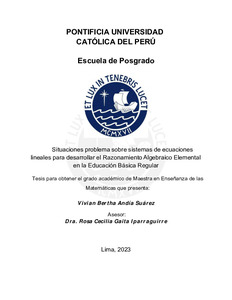| dc.contributor.advisor | Gaita Iparraguirre, Rosa Cecilia | |
| dc.contributor.author | Andia Suarez, Vivian Bertha | |
| dc.date.accessioned | 2023-11-28T15:28:33Z | |
| dc.date.available | 2023-11-28T15:28:33Z | |
| dc.date.created | 2023 | |
| dc.date.issued | 2023-11-28 | |
| dc.identifier.uri | http://hdl.handle.net/20.500.12404/26585 | |
| dc.description.abstract | Esta tesis tiene como eje central justificar por qué las situaciones problemas sobre sistemas de ecuaciones lineales contribuyen a desarrollar el razonamiento algebraico elemental en estudiantes de la educación básica regular. De aquí se desprenden dos objetivos específicos que se pretenden alcanzar: identificar situaciones problemas sobre los sistemas de ecuaciones lineales que se abordan en la educación básica regular peruana y relacionar las prácticas matemáticas que estas demandan con los niveles de algebrización del modelo de razonamiento algebraico.
Para ello, se toman como base algunas herramientas teóricas del Enfoque Ontosemiótico de la Instrucción Matemática, tales como, las configuraciones epistémicas para construir el significado de referencia de los sistemas de ecuaciones lineales en la educación básica regular, así como, los niveles de razonamiento algebraico elemental los cuales son adaptados a la noción de sistemas de ecuaciones lineales.
Se concluye que, a lo largo de la educación básica, se presentan diversas situaciones problema en donde el objetivo es encontrar una cantidad desconocida, siendo el modelo matemático en que estas se apoyan el de una ecuación o un sistema de ecuaciones lineales. Dichas situaciones son abordadas a través de diferentes procedimientos tales como el ensayo y error, utilizando diferentes lenguajes como las representaciones icónicas, de barras, numéricas y algebraicas, así como diversas justificaciones apoyadas en definiciones y propiedades de las operaciones aritméticas y las ecuaciones equivalentes.
A partir de esos hallazgos, se establece una relación entre configuraciones epistémicas correspondientes a los sistemas de ecuaciones lineales y rasgos de diferentes niveles de razonamiento algebraico. De esta manera, se espera contribuir con la formación de profesores de matemáticas brindándoles ejemplos que puedan ser empleados en su quehacer docente para desarrollar el razonamiento algebraico en sus estudiantes a través de los distintos grados de la escolaridad | es_ES |
| dc.description.abstract | The present study aims to justify why problem situations on systems of linear equations contribute to the development of elementary algebraic reasoning in students of regular basic education. Two specific objectives that are intended to be achieved follow from here: identify problem situations on systems of linear equations that are addressed in regular Peruvian basic education and relate the mathematical practices that these demand to the algebraization levels of the algebraic reasoning model.
For this purpose, some theoretical tools of the Onto-semiotic Approach to Mathematics Instruction are taken as a basis, such as epistemic configurations to build the reference meaning of systems of linear equations in regular basic education, as well as levels of elemental algebraic reasoning which are adapted to the notion of systems of linear equations.
It is concluded that, throughout basic education, there are various problem situations where the objective is to find an unknown quantity, the mathematical model on which these are based being that of an equation or a system of linear equations. These situations are addressed through different procedures such as trial and error, using different languages such as iconic, bar, numerical and algebraic representations, as well as various justifications based on definitions and properties of arithmetic operations and equivalent equations.
These findings suggest that a relationship is established between epistemic configurations corresponding to systems of linear equations and features of different levels of algebraic reasoning. In this way, it is expected to contribute to the training of mathematics teachers by providing them with examples that can be used in their teaching performance to develop algebraic reasoning of their students in the different school grades | es_ES |
| dc.language.iso | spa | es_ES |
| dc.publisher | Pontificia Universidad Católica del Perú | es_ES |
| dc.rights | info:eu-repo/semantics/openAccess | es_ES |
| dc.rights.uri | http://creativecommons.org/licenses/by-nc/2.5/pe/ | * |
| dc.subject | Matemáticas--Estudio y enseñanza | es_ES |
| dc.subject | Análisis vectorial | es_ES |
| dc.subject | Solución de problemas | es_ES |
| dc.subject | Educación secundaria--Perú | es_ES |
| dc.title | Situaciones problema sobre sistemas de ecuaciones lineales para desarrollar el Razonamiento Algebraico Elemental en la Educación Básica Regular | es_ES |
| dc.type | info:eu-repo/semantics/masterThesis | es_ES |
| thesis.degree.name | Maestro en Enseñanza de las Matemáticas | es_ES |
| thesis.degree.level | Maestría | es_ES |
| thesis.degree.grantor | Pontificia Universidad Católica del Perú. Escuela de Posgrado | es_ES |
| thesis.degree.discipline | Enseñanza de las Matemáticas | es_ES |
| renati.advisor.dni | 07757120 | |
| renati.advisor.orcid | https://orcid.org/0000-0002-7827-9262 | es_ES |
| renati.author.dni | 44380381 | |
| renati.discipline | 199117 | es_ES |
| renati.juror | Ugarte Guerra, Francisco Javier | es_ES |
| renati.juror | Gonzales Hernandez, Cintya Sherley | es_ES |
| renati.level | https://purl.org/pe-repo/renati/level#maestro | es_ES |
| renati.type | https://purl.org/pe-repo/renati/type#tesis | es_ES |
| dc.publisher.country | PE | es_ES |
| dc.subject.ocde | https://purl.org/pe-repo/ocde/ford#5.03.01 | es_ES |







